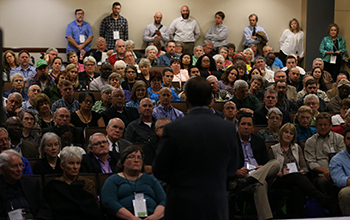Denison urges churches to prepare before receiving same-sex wedding request
WACO—Ministers and the churches they serve need to be prepared for the time when they will be asked to perform same-sex marriages, theologian and social analyst Jim Denison told Texas Baptists.
Decisions should be made in advance, based on serious biblical study and reflection—not in reaction when a couple approaches the pastor, he suggested.
Timely topic for Texas Baptists
 A standing-room-only crowd listened to Jim Denison discuss same-sex marriage. (Photo / Robert Rogers / Baylor University Marketing and Communication)Denison addressed a standing-room-only crowd as he led a workshop on “Same-sex Marriage and the Future of the Family” during the Baptist General Convention of Texas annual meeting.
A standing-room-only crowd listened to Jim Denison discuss same-sex marriage. (Photo / Robert Rogers / Baylor University Marketing and Communication)Denison addressed a standing-room-only crowd as he led a workshop on “Same-sex Marriage and the Future of the Family” during the Baptist General Convention of Texas annual meeting.
The founding president of the Denison Forum on Truth and Culture began with a three-point summary of his position: “Homosexual activity is wrong. This sin is not unforgivable. God loves us all, LGBT people included.”
He acknowledged the topic’s timeliness but insisted the session was planned long before two LGBT-affirming congregations and their relationship to the BGCT became a matter of concern to Texas Baptists.
A few days before the annual meeting, BGCT officials notified First Baptist Church in Austin and Wilshire Baptist Church in Dallas an affirming stance toward LGBT members would place them outside the bounds of “harmonious cooperation” with the state convention.
Exploring the Scripture
Churches need to understand the issues surrounding homosexuality from a biblical perspective, Denison insisted, focusing on several biblical references traditionally understood as prohibiting homosexual practices.
Genesis 19 tells the story about how and why Sodom and Gomorrah were destroyed, but it does not apply directly to the subject of same-sex marriage, he said. The story describes homosexual rape—not consensual sexual activity in committed relationships, he noted.
Instead, Denison concentrated on two other Old Testament verses and three New Testament passages.
Looking at Leviticus 18:22 and 20:13, he disputed the idea the verses were part of a holiness code applicable only to priests, saying the verses in question applied to the entire nation of Israel.
He also dismissed the argument that the verses do not apply because they were part of the Old Testament law. Unlike dietary restrictions, which were specifically overturned in the New Testament, these verses served as the foundation for several New Testament passages related to the subject, he said.
New Testament teaching
Denison described Romans 1:26-27 as “a critical passage” in forming a biblical view about homosexual behavior. He disputed the arguments of some contemporary interpreters who have applied the passage only to oppressive relationships, such as the abuse of young male servants by their masters.
The passage describes people of the same sex “consumed with passion for one another,” he noted, saying, “That describes consensual, not just oppressive, relationships.”
Two other passages—1 Corinthians 6:9-10 and 1 Timothy 1:8-10—list homosexual behavior in a list of other vices, he observed.
“We are all broken sexually,” he said. The fall of humanity infected every aspect of human behavior, he explained, but Christians for 20 centuries have understood the monogamous union of one man and one woman as the biblical standard.
Refuting arguments
Denison also disputed the argument the biblical writers were unaware of committed and consensual homosexual relationships. Both ancient Canaanite culture and the Greco-Roman world celebrated same-sex relationships.
“Same-sex marriage was legal in the Roman Empire until 342 A.D.,” he noted.
Denison also rejected attempts to frame LGBT rights activism as the 21st century equivalent of the Civil Rights movement.
“Race is inherited. The origin of homosexual orientation is in dispute,” he said. “Race cannot be chosen. Homosexual activity—not orientation but behavior—is a choice.”
Thanks to the First Amendment and separation of church and state, American Christian churches face no immediate threats, but they should be aware of the discrimination Christians who oppose same-sex marriage have faced in other countries, Denison said. For instance, Canadian churches have seen their tax-exempt status threatened, and Denmark requires churches to conduct same-sex marriages, he said.
Once marriage is defined as anything other than one man and one woman, it opens the door to further redefinition, such as polygamous unions, he added.
Suggestions for Christians
Rather than feel threatened by same-sex marriage, Denison offered four suggestions to Christians:
- “Engage the issue with a positive spirit.”
- “Be prepared to defend biblical beliefs.”
- “Make clear the religious liberty implications.”
- “Engage graciously with same-sex marriage leaders and the LGBT community.”